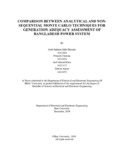Comparison between Analytical and Non-Sequential Monte Carlo Techniques for generation adequacy assessment of Bangladesh power system
Abstract
Generation system adequacy is employed to estimate the ability of the power system generation unit to fulfil the total system load. The assessment is conducted by calculating a common reliability index ‘Loss of Load Expectation (LOLE)’. The LOLE is a statistical measure of the the expected amount of energy not supplied due to a shortage of generation capacity under a probabilistic based scenario and is generally expressed in the number of hours or days.
The main objective of the research work presented in this thesis is to apply the commonly used probabilistic techniques in LOLE estimation of Bangladesh power generating units. This work calculates and compares the LOLE estimation using two different techniques: analytical technique and non-sequential Monte Carlo simulation techniques. Both techniques have been tested on the Bangladesh power system consisting of sixty-one generation units. The models, methodologies, results and discussion presented in this thesis provide helpful information for power system planners for assessing the adequacy of electric power generation systems.

